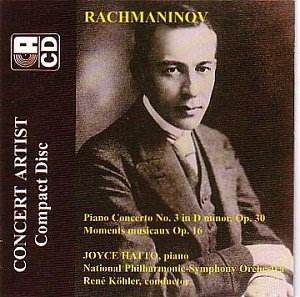Joyce Hatto is a fervent and impressive exponent of
the Russian literature as she has shown elsewhere in her recent and
extensive series of discs for Concert Artist. Here she takes on one
of the veritable peaks of the piano repertoire and emerges triumphant.
The Third Concerto, like the Paganini Variations, is not a piece much
recorded by women (with several notable and obvious exceptions, Argerich,
Cecile Ousset and de Larrocha being currently prominent but Hatto’s
British colleague Moura Lympany was once strongly associated with it).
But Hatto has never flinched from exploration of the repertoire, from
Bach to Bax and beyond and she shows no fear here.
She and conductor René Köhler take a relatively
relaxed tempo in the opening movement that is notable for Hatto’s articulacy
and tonal beauty. There is also a powerful sense of incipient explosive
energy in the cadential passage – sometimes even almost too much; this
is no polite performance. Hatto has a wide dynamic range and uses it
for musical, never self-regarding, reasons, and is constantly exciting.
Maybe the recording fudges the clarity of her downward runs from time
to time but it never obscures some really formidable interpretive power.
The recording itself is not over subtle; the distant balance means that
orchestral counter themes sometimes get muddied or half lost in the
acoustic but the playing itself here is commanding and impressive. In
the second movement Hatto makes the most of the potential for contrasts,
employs her still tremendous technique to fruitful ends, lavishing plenty
of expressive playing even at moments of highest digital demand. Her
sense of structural control in the finale is characterful and absolute;
she can inflect the line with mordant wit and the balance between piano
and orchestra is good. At moments of optimum expressive pointing one
still feels a powerful directional sense from her and as the movement
gathers steam she is mightily impressive, the peroration of the movement
galvanic in its success. This performance is yet more evidence of Joyce
Hatto’s status in the romantic repertoire and I’ll be reviewing her
recordings of the First and Fourth Concertos soon.
She includes the Op 16 Moments musicaux as a far from
insignificant filler. Her figuration in the central passage of the B
flat minor is full of filigree clarity, her rolled chords lavished with
an auburn beauty, the contrastive sonorities and colouristic potential
aptly delineated. The restless chromatic volatility of the E flat minor,
its surge and drama, is perfectly understood and the ripeness and effulgence
of the B minor presented with affectionate amplitude. When it comes
to passionate drive, though, passionate drive there is a-plenty; listen
to her in the E minor or in the bell peals of the concluding C major.
Some marvellously sensitive playing here.
Her stylistic and evocative affinities with this School
mark out Joyce Hatto as one of the most convincing exponents around.
Assurance and sensitivity are precious gifts and Hatto possesses them
in abundance.
Jonathan Woolf
See also review
by William
Hedley
Concert
Artist complete catalogue available from MusicWeb
International

